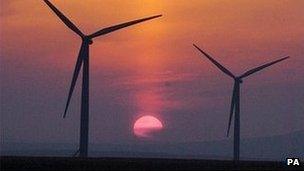Renewable energy: Onshore wind subsidy to be cut by 10%
- Published

The government wants to encourage more investment in renewable energy to meet targets
The subsidy for onshore wind energy generation is to be cut by 10%, the government has announced.
The Treasury is thought to have favoured a larger cut of up to 25%.
It is one of a number of cuts which <link> <caption>the Department for Energy and Climate Change said </caption> <url href="http://www.decc.gov.uk/en/content/cms/news/pn12_086/pn12_086.aspx" platform="highweb"/> </link> should encourage up to £25bn in new investment in energy generation between 2013 and 2017.
The measures should also reduce the impact on household energy bills, it said, saving £5-£6 a year on average.
Under the current arrangements £44 of the average household bill would go towards renewables in 2013-14, rising to £50 in 2016-17.
Under the new subsidy levels, that will be £6 less in 2013-4, £5 less in 2014-5, but will be £1 higher in 2015-6 and £3 higher in 2016-7.
Energy firms pass on the cost of investing in new cleaner generation to consumers, and MPs on the Commons Energy and Climate Change Committee warned earlier this month that cutting subsidies too fast could increase bills.
Energy Secretary Ed Davey said the projected investment of £20-25bn could also encourage the creation of "hundreds of thousands of jobs".
"The economy needs that investment and our climate change challenge needs this green energy," he told the BBC.
Uncertainty over the direction of government energy policy has been criticised by the industry and has led to delays in investment.
Wind farm company RES, which generates about 10% of the UK's onshore wind energy, said the subsidy announcement showed the government's commitment to renewables.
"The timescales associated with planning and developing much-needed infrastructure projects such as wind farms require stable, long-term policies to ensure investor confidence and engagement," said Gordon MacDougall from RES UK.
"RES is now more confident that we will be able to progress with our plans to bring forward £1.7bn of projects vital to UK energy security in the next five years, and deliver significant benefits to communities across the UK."
<bold>Target fears</bold>
BBC environment analyst Roger Harrabin said there had been a long-running battle between Mr Davey's Energy Department and the Treasury over the size of the cuts.
The 10% cut appears to be a victory for the Liberal Democrat energy secretary, our correspondent says, against some Conservative MPs who had lobbied for a much bigger cut.
The Energy Department has also said that if gas "proves cheap" it will play a major role after 2030, by which time the UK should have substantially reduced its carbon emissions from energy generation.
This follows insistence from the Treasury that UK consumers should benefit from any falls in gas prices, Roger Harrabin said.
The announcement also included £500m in tax breaks to try to encourage investment in shallow-water gas fields, which have relatively low profit margins.
The continued role of gas in the energy strategy has raised fears that the UK could breach renewable energy targets as well as concerns about the volatility of gas prices.
"Treasury arm-twisting has forced [Ed Davey] to give his backing to new gas-fired power stations - which is completely at odds with his fuzzy rhetoric on clean British energy," said environmental campaign group Friends of the Earth.
"George Osborne's plans for more gas-fired power stations would be a costly disaster for households, businesses and the environment," said Andrew Pendleton from the campaign group.
"It's time for David Cameron, the self-styled leader of the greenest government ever, to intervene."
The government's official advisers on the Climate Change Committee have said that the increased use of gas could lead to targets being breached unless carbon capture technology is advanced to clean up emissions from gas.
Shadow energy secretary Caroline Flint claimed government in-fighting was harming the drive to get companies to invest in greener energy generation.
"George Osborne's meddling in energy policy is more to do with courting his anti-clean energy backbenchers, than securing the jobs and growth low carbon investment offers, which Britain badly needs," she said.
- Published23 July 2012
- Published5 July 2012
- Published17 July 2012
- Published22 May 2012
- Published26 April 2012